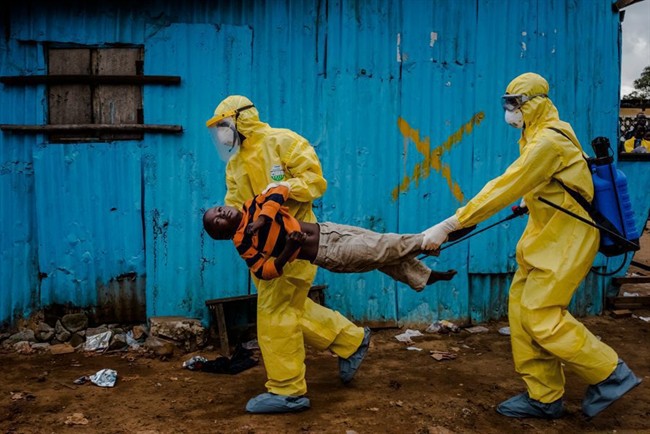The deadly virus was in their blood, sweat, tears and bodily fluids – American scientists are embarking on a five-year study that’ll look at Ebola survivors and their loved ones to determine the long-term effects of battling the disease.

About 1,500 Ebola survivors and 6,000 relatives in Liberia will be followed for a handful of years so that doctors can understand if survivors develop immunity and if transmission can still occur to loved ones and sexual partners.
The study is sponsored by the Ministry of Health of Liberia and the U.S. National Institute of Allergy and Infectious Diseases.
“The clinical course of Ebola virus disease is reasonably well-understood, but we still have much to learn about the long-term health effects of the illness in those who recover,” Dr. Anthony Fauci, NAIAID director, said in a government statement.
READ MORE: How does Ebola spread? 5 things you need to know
“To unravel the many unknowns, we have expanded the focus of our partnership with Liberia’s Ministry of Health to include research on the long-term health effects of Ebola virus disease, in addition to our ongoing efforts to find an effective preventive vaccine and treatments,” he said.
How the study will work
Study participants will have their medical history recorded along with physical and vision tests. Blood samples will be collected while their organ health will be monitored to check for Ebola antibody levels. Survivors will also be asked for samples of their sweat, tears, semen and other bodily fluids.
Each survivor is responsible for identifying five relatives – ideally family members living under the same roof when they were initially diagnosed, along with sexual partners after they recovered from the disease. These relatives will also have their medical records documented.
- Health task force blasted over ‘dangerous guidance’ for cancer screenings
- Dentists hesitant to sign up for federal dental plan; seniors advised to look at all options
- David Chang’s Momofuku to stop ‘chile crunch’ trademark battle after outcry
- Over 25% of young Canadian deaths linked to opioids amid pandemic: study
READ MORE: Ebola found in doctor’s eye months after it was gone from his blood
Follow ups will occur every six months during the five-year period. The researchers hope to zero in on vision problems, immune system changes, mental health disorders, joint pain, diabetes, high blood pressure and pregnancy complications.
In the wake of the Ebola epidemic that rocked West Africa, scientists have pulled together bits and pieces of information on the health of survivors.
Men who have survived the virus need to abstain from sex for three months to reduce the risk of transmission, for example. World Health Organization officials warned that the deadly virus could stay in their semen for up to 82 days – longer than in the blood or other bodily fluids.
READ MORE: World Health Organization declares Liberia free of Ebola
Keep in mind, sexual transmission of Ebola has not been documented. But in four studies of about 43 patients, three men who recovered from Ebola reportedly shed live virus in their semen 40 days after onset of symptoms, 61 days and even 82 days later.
WHO says that it’s unclear if semen that tests positive for Ebola is infectious.
Ebola can only be spread to others after symptoms begin.
“You can’t share it with anybody. It happens only when it comes out through bodily fluids,” according to Jason Tetro, a Canadian microbiologist and author.
Ebola grows within your cells, multiplying until you build up a high level of the virus. That’s why it takes time to appear in bodily fluids.
READ MORE: Canada prepping for potential Ebola cases
“Even though the virus is growing within the body, during that incubation period there isn’t sufficient amount of virus to transmit disease to others until the illness is apparent,” Dr. Joel Kettner explained.
The virus is passed on via bodily fluids
Once your symptoms kick in – the fever, the nausea and stomach pain, for example – you’re contagious.
“Bodily fluids” refers to blood, vomit, feces, urine, spit, sweat, semen and even tears.
Some bodily fluids have higher counts of the disease than others. Doctors say that the disease is hard to transmit because you have to be in “very close contact” with an infected person and his or her fluids. It’s not airborne like, say, the seasonal flu or the chicken pox, which are both highly contagious.
It’s not as simple as touching a door knob with a sick patient’s germs, Kettner said.
READ MORE: How health officials are responding to the Ebola outbreak globally
If you have a break in the skin – a cut, scratch or blister – the virus can get into your bloodstream by getting through the barrier the skin provides. It can also enter through the lining of the eye, nasal passages or the mouth – it’s here that the virus can get absorbed easier than through the skin.
It can also be transmitted via sexual contact, objects (such as needles) contaminated with the virus or through the blood or fluids of infected animals and their meat.
carmen.chai@globalnews.ca
Follow @Carmen_Chai




Comments